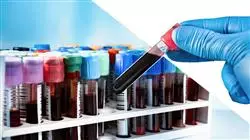University certificate
The world's largest faculty of medicine”
Introduction to the Program
Students will be able to acquire skills to manage clinical risks in hospital settings with TECH's Technological University Postgraduate certificate in Clinical Risk Assessment in Health Care"

Health Care surveillance is a complex and changing environment in which critical decisions must be made in real time. In this context, clinical risk management is fundamental to ensure patient safety and the quality of care provided. Therefore, it is necessary for health care professionals to be updated in the techniques and methodologies that allow them to assess and solve the hazards associated with their clinical practice.
The objective of the Postgraduate certificate in Clinical Risk Assessment in Health Care is to comprehensively update students in the management of adversities in hospitals and primary care.
The pedagogical methodology used in the program is Relearning where students will acquire the necessary skills to identify, assess and manage clinical risks in any situation. Additionally, they will be provided with detailed didactic material and a large number of case studies that will allow them to apply theoretical knowledge in real situations. They will also be able to organize the academic resources in a flexible way to adapt to their schedules and requirements.
Another outstanding feature of the Postgraduate certificate is that the teaching staff is made up of professionals with extensive experience in the field of quality and patient safety. They are also experts in the use of new technologies in the health care field. This ensures that students will receive up-to-date and relevant information from prestigious practicing specialists.
Enroll now so that the most experienced teachers can share their knowledge on adversity management in health care environments"
This Postgraduate certificate in Clinical Risk Assessment in Health Care contains the most complete and up-to-date scientific program on the market. The most important features include:
- The development of case studies presented by experts in Clinical Risk Assessment in Health Care
- The graphic, schematic and eminently practical contents with which it is conceived gather scientific and practical information on those disciplines that are indispensable for professional practice
- Practical exercises where self-assessment can be used to improve learning
- Its special emphasis on innovative methodologies
- Theoretical lessons, questions to the expert, debate forums on controversial topics, and individual reflection assignments
- Content that is accessible from any fixed or portable device with an Internet connection
The Relearning method used by TECH Global University will allow you to learn efficiently and with a perspective of continuous improvement in Clinical Risk Assessment in Health Care"
The program’s teaching staff includes professionals from the field who contribute their work experience to this educational program, as well as renowned specialists from leading societies and prestigious universities.
The multimedia content, developed with the latest educational technology, will provide the professional with situated and contextual learning, i.e., a simulated environment that will provide immersive education programmed to learn in real situations.
This program is designed around Problem-Based Learning, whereby the professional must try to solve the different professional practice situations that arise during the course. For this purpose, students will be assisted by an innovative interactive video system created by renowned experts in the field of educational coaching with extensive experience.
The multimedia and multi-channel resources available in the program will provide you with a complete and enriching learning experience in TECH Global University"

Enroll now to acquire relevant and highly valued skills in the job market"
Why study at TECH?
TECH is the world’s largest online university. With an impressive catalog of more than 14,000 university programs available in 11 languages, it is positioned as a leader in employability, with a 99% job placement rate. In addition, it relies on an enormous faculty of more than 6,000 professors of the highest international renown.

Study at the world's largest online university and guarantee your professional success. The future starts at TECH”
The world’s best online university according to FORBES
The prestigious Forbes magazine, specialized in business and finance, has highlighted TECH as “the world's best online university” This is what they have recently stated in an article in their digital edition in which they echo the success story of this institution, “thanks to the academic offer it provides, the selection of its teaching staff, and an innovative learning method aimed at educating the professionals of the future”
A revolutionary study method, a cutting-edge faculty and a practical focus: the key to TECH's success.
The most complete study plans on the university scene
TECH offers the most complete study plans on the university scene, with syllabuses that cover fundamental concepts and, at the same time, the main scientific advances in their specific scientific areas. In addition, these programs are continuously being updated to guarantee students the academic vanguard and the most in-demand professional skills. In this way, the university's qualifications provide its graduates with a significant advantage to propel their careers to success.
TECH offers the most comprehensive and intensive study plans on the current university scene.
A world-class teaching staff
TECH's teaching staff is made up of more than 6,000 professors with the highest international recognition. Professors, researchers and top executives of multinational companies, including Isaiah Covington, performance coach of the Boston Celtics; Magda Romanska, principal investigator at Harvard MetaLAB; Ignacio Wistumba, chairman of the department of translational molecular pathology at MD Anderson Cancer Center; and D.W. Pine, creative director of TIME magazine, among others.
Internationally renowned experts, specialized in different branches of Health, Technology, Communication and Business, form part of the TECH faculty.
A unique learning method
TECH is the first university to use Relearning in all its programs. It is the best online learning methodology, accredited with international teaching quality certifications, provided by prestigious educational agencies. In addition, this disruptive educational model is complemented with the “Case Method”, thereby setting up a unique online teaching strategy. Innovative teaching resources are also implemented, including detailed videos, infographics and interactive summaries.
TECH combines Relearning and the Case Method in all its university programs to guarantee excellent theoretical and practical learning, studying whenever and wherever you want.
The world's largest online university
TECH is the world’s largest online university. We are the largest educational institution, with the best and widest online educational catalog, one hundred percent online and covering the vast majority of areas of knowledge. We offer a large selection of our own degrees and accredited online undergraduate and postgraduate degrees. In total, more than 14,000 university degrees, in eleven different languages, make us the largest educational largest in the world.
TECH has the world's most extensive catalog of academic and official programs, available in more than 11 languages.
Google Premier Partner
The American technology giant has awarded TECH the Google Google Premier Partner badge. This award, which is only available to 3% of the world's companies, highlights the efficient, flexible and tailored experience that this university provides to students. The recognition as a Google Premier Partner not only accredits the maximum rigor, performance and investment in TECH's digital infrastructures, but also places this university as one of the world's leading technology companies.
Google has positioned TECH in the top 3% of the world's most important technology companies by awarding it its Google Premier Partner badge.
The official online university of the NBA
TECH is the official online university of the NBA. Thanks to our agreement with the biggest league in basketball, we offer our students exclusive university programs, as well as a wide variety of educational resources focused on the business of the league and other areas of the sports industry. Each program is made up of a uniquely designed syllabus and features exceptional guest hosts: professionals with a distinguished sports background who will offer their expertise on the most relevant topics.
TECH has been selected by the NBA, the world's top basketball league, as its official online university.
The top-rated university by its students
Students have positioned TECH as the world's top-rated university on the main review websites, with a highest rating of 4.9 out of 5, obtained from more than 1,000 reviews. These results consolidate TECH as the benchmark university institution at an international level, reflecting the excellence and positive impact of its educational model.” reflecting the excellence and positive impact of its educational model.”
TECH is the world’s top-rated university by its students.
Leaders in employability
TECH has managed to become the leading university in employability. 99% of its students obtain jobs in the academic field they have studied, within one year of completing any of the university's programs. A similar number achieve immediate career enhancement. All this thanks to a study methodology that bases its effectiveness on the acquisition of practical skills, which are absolutely necessary for professional development.
99% of TECH graduates find a job within a year of completing their studies.
Postgraduate Certificate in Clinical Risk Assessment in Health Care
Proper identification and management of clinical risks is an essential element in the provision of quality and safe health care. At TECH Global University, we are committed to training highly skilled healthcare professionals in clinical risk assessment, and therefore, we present our Postgraduate Certificate in Clinical Risk Assessment in Healthcare. This virtual classroom program is designed to provide participants with the knowledge and skills necessary to identify, assess and manage clinical risks in the healthcare setting.
In this Postgraduate Certificate, participants will learn about the fundamentals of clinical risk assessment, including adverse event identification, root cause analysis, and assessing the likelihood and impact of adverse events. Incident reporting and management, effective communication in risk situations, and implementation of preventive and corrective measures will also be addressed. In addition, the tools and methodologies used in clinical risk assessment will be explored, as well as the regulations and standards applicable in the healthcare environment. This Postgraduate Certificate will provide participants with the necessary skills to apply clinical risk assessment strategies in healthcare, thereby contributing to the improvement of patient safety and quality of care in healthcare institutions.







